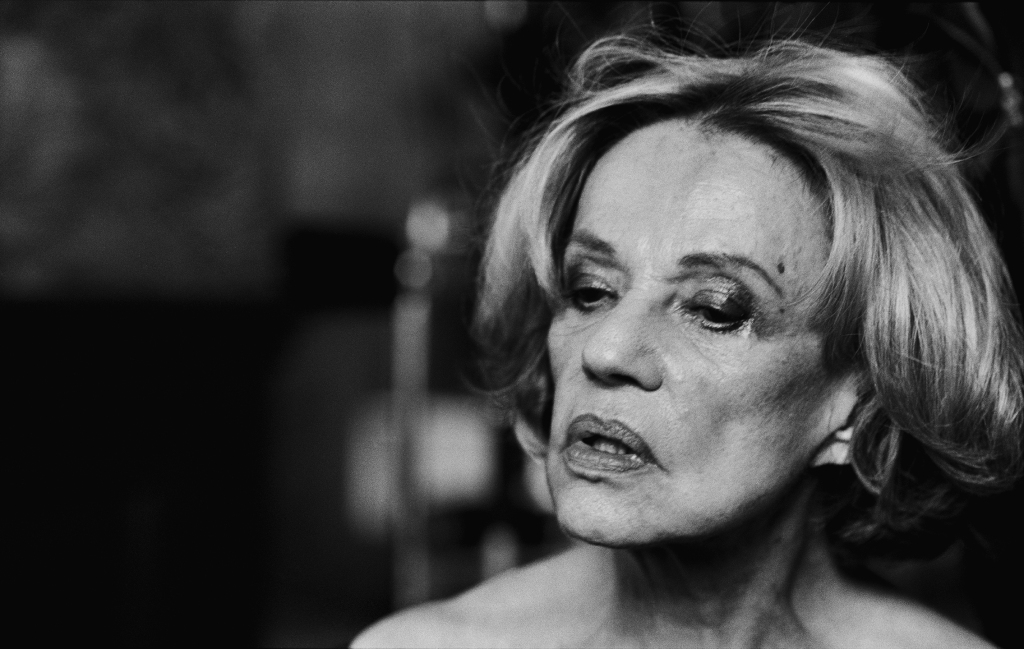The first word I think of to describe the aura of Jeanne Moreau isn’t a word at all: Unfuckwithable. I feel certain the French probably have a more elegant phrase for it, but the thrust of the idea is this: Moreau’s unique screen alchemy defies conventional adjectives. Her star power had a combination of reserve and ferocity to it, an intellect that aided and abetted her raw physicality, a melancholy that ensconced her even while singing or dancing. It made her as powerful and self-contained as a fire borne of spontaneous combustion.
By comparison to her contemporaries, Moreau found screen stardom relatively late in life. She was already an established theatre actress at the renowned Comédie-Française before she began acting in films, and even then it was a few years before she crossed paths with young director Louis Malle. She was 30 when she gave that first immortal performance in Louis Malle’s “Elevator to the Gallows,” wandering the Parisian streets inconsolably to a percussive, lachrymose jazz score provided by Miles Davis.
She would go on to work with what was essentially a who’s who of French New Wave directors and arthouse film intelligentsia. She even fit several Orson Welles films in between her European ventures (“The Trial,” “Chimes at Midnight” and “The Immortal Story”), inspiring him to say she was “the greatest actress in the world.”
Moreau was a mercurial romantic in “Jules et Jim,” a lightning rod of righteous vengeance in “The Bride Wore Black,” and practically a human molotov cocktail in “Mademoiselle.” She shatters bourgeois values in “Diary of a Chambermaid,” giggles her way through an anti-imperialist comedy schtick in “Viva Maria!,” and always draws all the attention and air from the room she walks into. She’s breathtaking.
What first struck me about Moreau wasn’t actually her embodiment of unique traits; it was her lack of the ones that I’d always seen, to some extent, in other female screen stars. She was never girlish or coy; she was mature and womanly. Even at her most daffy and spritely—as Catherine in “Jules et Jim,” for example—she always seemed grounded by something. She was more in the vein of an earthy, elemental, Italian actress like Anna Magnani than with other French cinema stars of the period.
Moreau wasn’t the sort of empty-vessel cipher presented by Anna Karina in much of Jean-Luc Godard’s work—or a sex goddess avatar like Brigitte Bardot. She was overtly sensual, and even sometimes an archetypal object of male lust, but she never seemed to belong to anyone but herself. Even when men left her, spurned her, or cast her aside, she seemed complete.
In many ways, Moreau’s film career was still defined by men and the popular auteurism that ruled the ‘60s and ‘70s. She worked with only two women directors throughout her entire career—once with novelist Marguerite Duras in 1972’s “Nathalie Granger,” and decades later, in 2001, playing Duras in “Cet amour la” for her friend and director Josée Dayan. Dayan and Moreau worked together twice more before Moreau’s death, but none of the actresses’ collaborations with women garnered anything like the sort of fame her earlier auteur-led projects did. In her life, she was averse to “joining” any group with a party line, including the women’s movement. But she was also keen to try her hand at directing, making two feature films in the 1970’s and a television documentary on silent film doyenne Lillian Gish. I’ve yet to see them, but they promise an unfaltering ambition and curiosity about the craft of filmmaking.

In the liminal space she occupies, it may seem an odd contention to champion Jeanne Moreau as some kind of proto-feminist heroine. But her stardom has never been concretely political or wholly “empowering” in that sense. Instead, her screen presence is fluid and primal. It’s a combination of knowing, wise femininity and comfort in the power one can wield with it. She is unfazed, defiant, and self-assured in a way that absolutely compelled me as a young film student.
For me, there was always something about Moreau. During the male-dominated, canon-heavy curriculum I and so many other film students spent our formative years absorbing, she stood out to me like nearly no other film actress did. She was sexually confident instead of performatively sexual, personifying elegant refusal rather than petulant rebellion. She made me want to be a grown-up woman rather than a youthful girl; to embrace the half-moons under my eyes and blow Gauloise smoke from my world-weary lips. As Patti Smith admiringly points out, it’s Jeanne Moreau who inspired her to “think girl stuff is where it’s at.”
After watching Moreau’s films, the musician concluded, “When I’m about 35, I’m going to start wearing black cocktail dresses and become a real c***.” Smith is making a very specific point in using that nasty, oft-misogynistic word. She cheerfully refers to herself—and by extension, to Jeanne Moreau—with it. But Moreau exemplifies those things that men resent, the traits that can put a woman on the receiving end of such a mortifying insult: she’s mature, powerful, and—yes—unfuckwithable.
Moreau always seemed to operate outside of the realm of male control, in spite of working with a glut of male film directors. And she was utterly disinterested in sentimentality, both onscreen and off. In real life, she detested nostalgia, brushed off star-gazing interviewers, and adamantly set the record straight. On-screen, she had portrayed women who walked away from their children or husbands without a second glance (“Les Amants,” 1958) or turned psychotically on their lovers (“Mademoiselle,” 1966). For Patti Smith—and for me, too—Jeanne Moreau personified the art of refusal, even at its most brusque and unlikeable. In that way, she was revolutionary.











